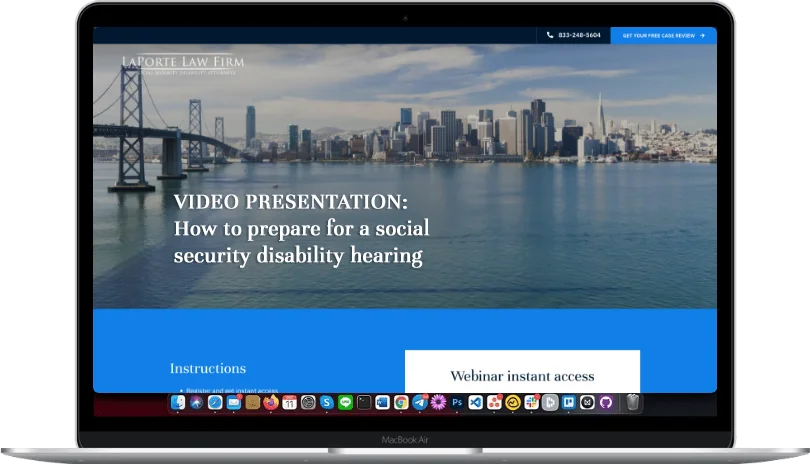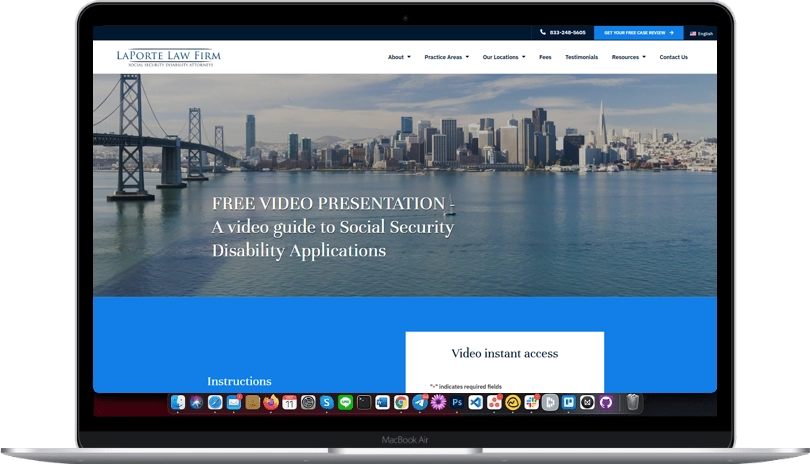
Every year, millions of individuals file for disability benefits, entrusting federal agencies with a significant amount of sensitive information. From Social Security numbers to detailed medical records, the data involved in these claims can be an attractive target for scammers. And with the creation of the Department of Government Efficiency (DOGE), recent reporting has heightened concerns that individuals’ private information may be at risk when filing a claim for Social Security disability.
In this article, we’ll explore the various security concerns surrounding disability claims and what steps you can take to minimize your risk. Whether you are currently in the process of applying or considering a future claim, being aware of potential vulnerabilities can help you take the necessary precautions to protect your data.
Recent Reporting: The DOGE Controversy and What It Means for Claimants
In August 2025, Charles Borges, the Social Security Administration’s (SSA) Chief Data Officer, became a whistleblower when he filed a complaint alleging that members of DOGE uploaded a copy of sensitive Social Security data to a cloud server, putting the personal identifiable information of millions of Americans at risk of being leaked or hacked. It is currently unknown which database was uploaded. Moreover, there is no evidence that the database has been breached or used inappropriately. What we do know is that the database includes individuals’ names, addresses, and dates of birth, among other details that can be used to steal an identity.
Following its establishment on January 20, 2025, DOGE personnel began requesting internal data from the SSA in February 2025 to support investigations into potential fraud. As part of this effort, DOGE employees attempted to access sensitive SSA data.
Starting around March 14, 2025, DOGE officials were granted broad access to multiple SSA databases, including those containing information on Social Security number (SSN) applicants and the application process. Some of this access reportedly occurred outside of standard authorization procedures. The access may have included federal tax information, which raises concerns about potential statutory violations.
DOGE’s access to SSA data reportedly expanded when personnel appeared to authorize the creation of a copy of SSA’s full dataset on the American public, without independent security review or oversight. This began with a request for SSA professionals to establish a cloud environment where the agency’s Numerical Identification System (NUMIDENT) data could be transferred to a private cloud service. An SSA official characterized this request as “high-risk” due to the sensitive nature of NUMIDENT data.
Despite the concerns, it was later learned by the whistleblower that the NUMIDENT production data was transferred to a test cloud environment. The setup and transfer may have implications under multiple federal statutes.
Why NUMIDENT matters
The SSA’s NUMIDENT file contains all Social Security numbers (SSNs) since they were first issued in 1936. This is incredibly sensitive data and can be used to steal your identity. NUMIDENT also contains all data submitted in an application for a Social Security card. This includes your name, place and date of birth, citizenship, race and ethnicity, parents’ names and Social Security numbers, phone number, and address.
Agency response
The SSA has stated that it takes all whistleblower complaints seriously, that it was “not aware of any compromise to this environment,” and that the agency is “dedicated to protecting sensitive personal data.”
A spokesperson for the SSA has further explained that “SSA stores all personal data in secure environments that have robust safeguards in place to protect vital information,” he said. “The data referenced in the complaint is stored in a longstanding environment used by SSA and walled off from the internet. High-level career SSA officials have administrative access to this system with oversight by SSA’s information security team.”
How the SSA protects your personal information
The concerns over DOGE’s access to SSA data have called attention to the methods the agency uses to store personal information safely.
The personal information and data maintained by the SSA are protected by several laws and regulations, including the Privacy Act of 1974, Section 1106 of the Social Security Act, the E-Government Act of 2002, Section 6103 of the Internal Revenue Code, as well as related SSA policies and other federal rules and statutes.
The SSA uses an internal program to store data that complies with the National Institute of Standards and Technology Cybersecurity Framework, which provides guidance on how to reduce cybersecurity risk. The agency also has internal guidelines in place that restrict access to data, ensuring only the employees who need to see personal data to perform official duties can access it.
Navigating Disability Claims and Protecting Your Privacy
When you apply for Social Security disability benefits, you’re required to provide a large amount of sensitive personal, financial, and medical information. This includes your Social Security number, medications and medical records, income details, bank account wiring and account number, and even information about your spouse. Understanding exactly what information is needed helps you prepare your application and take steps to protect your privacy.
The Dual Challenge: Seeking benefits while safeguarding personal information
To access disability benefits, individuals must provide the SSA with sensitive personal and medical information to prove their eligibility. This is necessary to ensure that benefits are provided to those who truly qualify. However, collecting and storing this detailed information also creates a privacy risk. If the data is mishandled or exposed, it could lead to identity theft or misuse of personal health information (PHI).
For example, someone applying for disability due to a mental health condition must submit medical records and a Social Security number; if that data is improperly accessed, it could reveal private health details and compromise their identity. Another risk is that scammers will use personal information for Social Security scams. For more information about what to do if you are the victim of a Social Security scam, check out our blog article on the topic.
What specific personal information may be most vulnerable?
Sensitive data shared with the SSA is among the most vulnerable to cyberattacks due to its potential value and misuse.
1. Basic personal identifiers
When applying for disability benefits, you must provide key personal details such as your full name, address, email address, and phone number. The application also includes highly sensitive information such as your Social Security number, date and place of birth, and any other names you’ve used. You may also be asked to provide information about your spouse or children, including their name, SSN, and address.
2. Financial statements and income details
Your file with the SSA will include your earnings history, such as records of your income from employers over the course of your working life. If you’re applying for Supplemental Security Income (SSI), you’ll also need to show financial need. This may include details such as bank account numbers and balances, housing costs, and other sources of income.
3. Medical information and records
To evaluate your disability claim, the SSA collects your medical records starting from one year before the date your disability began up through the date of their decision. This may include diagnoses, treatment history, test results, hospital stays, and provider notes, all of which are considered sensitive health information.
SSA Forms and Agency Processes Claimants Should Know
In order for the SSA to process your claim, they must have specific authorization to access your personal information, including medical and other confidential records. This authorization is required by law and ensures that the SSA has your permission to obtain the information needed to evaluate your case. Without the proper completion and submission of these authorization forms, the SSA is not legally allowed to access your information. If that information isn’t provided, they will be unable to proceed with your application or make a decision regarding your claim.
What is SSA-827?
The SSA-827 form, titled “Authorization to Disclose Information to the Social Security Administration (SSA),” is a legal document that gives the SSA permission to request and receive your private information, such as medical records, educational records, employment history, and other personal details relevant to your disability claim. The SSA needs this information to evaluate your claim for Social Security Disability Insurance (SSDI) or Supplemental Security Income (SSI) and to make a decision about your eligibility.
Without your signed authorization on SSA-827, the agency cannot access your confidential records and, as a result, cannot proceed with your application or make a decision regarding your claim. You also have the right to revoke this authorization at any time by submitting a written request, although doing so may affect the handling of your claim. Proper completion, including your signature and date, is essential for SSA-827 to be valid.
The form is only valid for 12 months from the date you sign it. Because of this, during the review or processing of your claim, the SSA may ask you to complete and submit a new SSA-827 form multiple times so they can continue obtaining the necessary information. This helps ensure that they have current authorization to access your records throughout the entire claims process. It’s important to respond promptly to these requests to avoid delays in your claim.
What is SSA-8240?
The SSA-8240 form grants the SSA authorization to obtain your wage and employment information directly from payroll data providers. These providers include payroll companies, wage verification services, and other entities that collect and maintain data about your employment and earnings. The SSA uses this authorization to access accurate wage and employment records needed to process your claim. Completing and submitting SSA-8240 is required for the SSA to move forward with reviewing your application. You also have the right to revoke this authorization at any time by submitting a written request, though doing so may affect the processing of your claim.
NUMIDENT vs. your SSA file
The Master NUMIDENT record, which was the subject of the whistleblower complaint, is a centralized database maintained by the SSA that contains basic personal information about every individual who has been assigned a Social Security number. This record includes data such as an individual’s name, date of birth, SSN, date of death (if applicable), and other demographic details. Because the Master NUMIDENT serves as a foundational record for many SSA programs, access to it is broadly controlled but generally available to SSA personnel who need to verify identity or process benefits across all SSA programs.
In contrast, individualized SSA disability claims files are highly detailed records specific to a person’s disability application or case. These files include sensitive and comprehensive information such as medical records, wage data, application materials, and the SSA’s internal notes and determinations regarding your disability claim. Access to these files is much more restricted. Only you, your authorized representatives, and SSA staff directly involved in adjudicating or managing your disability claim are permitted to view this information. This tighter access control protects your privacy due to the sensitive nature of the medical and personal information contained within these files.
Steps to Protect Your Personal Information
According to the SSA, there is no reporting that suggests that SSA disability claim files were exposed to the private cloud server or improperly accessed by DOGE employees. However, this highlights the ongoing need for vigilance, accountability, and robust cybersecurity measures to protect individuals’ most private information. You can do you part in safeguarding your personal information by taking these steps:
Protect your Social Security number
Your SSN is a unique nine-digit number used to track your earnings and determine eligibility for Social Security benefits. Because it can also be used to open accounts, apply for credit, or access personal records, it’s important to protect it from misuse.
Do not carry your Social Security card or documents that display your SSN unless absolutely necessary. Store your card in a safe, secure place. Only share your SSN when it’s legally required, and always ask why it’s needed, how it will be used, and how it will be protected. To help prevent identity theft, open a my Social Security account before someone else tries to fraudulently create one in your name.
Protect your medical and health records
Medical records are documents that contain your personal health information, including details about your diagnoses, treatments, medications, test results, and doctor visits. These records are often needed when applying for Social Security disability benefits to prove your medical condition.
The Health Insurance Portability and Accountability Act (HIPAA) is a federal law that protects the privacy of your medical information and sets rules for how it can be shared by healthcare providers. HIPAA Privacy and Security Rules dictate how organizations handle protected health information. The HIPAA Security Rule sets national standards to protect electronic protected health information (ePHI). It requires regulated entities, such as healthcare providers and their partners, to implement administrative, physical, and technical safeguards to secure ePHI within their IT systems. The HIPAA Privacy Rule complements this by requiring safeguards to limit unnecessary access to all PHI and by establishing rules for how PHI can be used or disclosed, such as for treatment or public health purposes.
However, if you have your own copy of your medical records, which can be helpful when filing a disability claim, it’s your responsibility to keep them safe. Store paper copies in a secure place, such as a locked drawer or safe. If you keep digital copies, make sure they are password-protected and stored on a secure device or network to prevent unauthorized access.
What to Do If Your Data Is Accessed Without Authorization
If you believe your personal information related to your Social Security records has been accessed by an unauthorized party, it’s important to act quickly to protect yourself. The following steps can help you respond effectively and minimize potential harm.
Report fraud to the SSA
If you believe your identity has been stolen, the SSA has the authority to investigate and take action against those criminals once you report the issue to us. If you suspect someone is committing fraud, waste, or abuse involving Social Security, you can submit a report online at oig.ssa.gov or contact the SSA’s Office of the Inspector General fraud hotline at 1-800-269-0271.
You can also report identity theft and learn what steps to take next by visiting IdentityTheft.gov, where you can also obtain a Federal Trade Commission (FTC) Identity Theft Report and access a personalized recovery plan.
Freeze credit reports and place fraud alerts
Placing a fraud alert on your credit report notifies creditors to take extra steps to verify your identity before opening a new account, issuing a new credit card, or increasing the credit limit on an existing account at your request. This added layer of protection helps prevent identity thieves from opening new lines of credit in your name.
You can place an initial fraud alert if you believe you are, or are about to become, a victim of identity theft or fraud. The three major credit reporting agencies — Equifax, Experian, and TransUnion — are required to keep the alert on your credit file for one year. After that period, the alert will expire and be automatically removed. However, you have the option to place another fraud alert once the initial one expires.
In addition to placing fraud alerts, you can also freeze your credit reports, which blocks most access to your credit file entirely. This means new creditors can’t view your report until you lift the freeze, making it much harder for identity thieves to open new accounts in your name.
Both of these tools are free and can be essential steps in recovering from or preventing identity theft.
Not sure who can access your Social Security records or what’s being shared? LaPorte Law Firm can help you understand your privacy rights and what to do if something doesn’t seem right. Contact us today to speak with someone who knows the system inside and out.
FAQS
If you suspect your Social Security number or medical records may have been compromised, take immediate action. Report identity theft at IdentityTheft.gov to create a recovery plan and obtain an official FTC Identity Theft Report. Contact the Social Security Administration at 1-800-772-1213, and report suspected fraud to the Office of the Inspector General at oig.ssa.gov or 1-800-269-0271. Place a fraud alert or freeze your credit with the major credit bureaus to prevent unauthorized accounts. If your medical records are involved, notify your health insurance provider and request a claims history to check for suspicious activity.
HIPAA safeguards your medical records from being shared without your consent, and the SSA rules follow strict privacy standards. The SSA does not share your claim details, medical records, or decisions with employers, insurers, or other third parties unless you provide written authorization. Only SSA personnel involved in processing your case can access your file.
SSA-827 is an authorization form that allows the SSA to request and review your private records to process your disability claim. By signing it, you permit the SSA to access medical records, mental health information, employment and education records, and other sensitive data relevant to your case. This information is only shared with the SSA personnel involved in your claim, and you can revoke your consent in writing at any time. The form is valid for 12 months and may need to be renewed if your claim is still being processed.
















